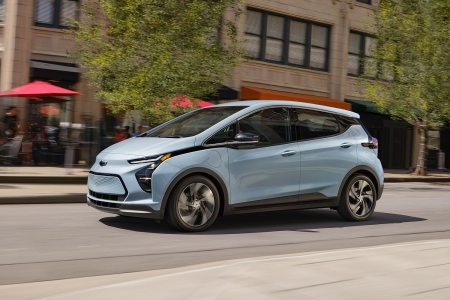The U.S. electric car race has been lopsided for years, with Tesla far out in front and the rest of the automotive brands vying for second place. Last year, Ford nabbed that silver medal as its Mustang Mach-E was the third best-selling EV in the country behind the Model Y and 3; but in 2023, a new contender has surged ahead: the Chevy Bolt, a vehicle that’s being discontinued.
In April, General Motors announced that its Chevrolet brand would end production of its Bolt lineup, which includes a smaller EV hatchback and larger EUV crossover model, because the vehicles are built on an older platform and the automaker needs to make room in manufacturing facilities for a new era of electric vehicles, including the Silverado EV. As we reported at the time, axing the Bolt by the end of 2023 means getting rid of the most affordable EV currently being sold by a major automaker.
Looking at current vehicle registration numbers for the first quarter of the year, GM may end up regretting their decision to phase out the economical EVs. While Tesla dominated with 6 in 10 registrations, according to Experian data cited by Automotive News, Chevrolet came in second with 7.7% of the market thanks to its Bolt lineup. That’s 19,947 new vehicles registered, compared to just 13,362 registrations for Ford across its Mustang Mach-E, F-150 Lightning and E-Transit models. Fourth place went to Volkswagen, which counted 10,053 new registrations for its only electric vehicle in the United States, the ID.4.
Buy the Highly Underrated Chevrolet Bolt EV or EUV Before They’re Discontinued
The leader in affordable electric vehicles is officially on the chopping blockThe main appeal of the Bolt vehicles is the price (the EV model starts at just $26,500), which is made even more enticing considering that the federal tax credit for electric vehicles once again applies to the models. It was previously rescinded because, as Automotive News explains, “GM, like Tesla, lost access to the credit in 2020 after hitting its 200,000-vehicle quota under the old rules.” That incredibly affordable price tag, a major outlier among the current crop of new EVs, is paired with respectable range numbers — an EPA-estimated 259 miles for the hatchback and 247 miles for the crossover.
There’s one big reason GM feels comfortable giving up its EV contender: it has a new entry-level replacement coming in the fall, the Equinox EV, an electric SUV that it’s promising will start around $30,000. But final pricing isn’t set just yet, and with other automakers continually increasing the prices of their modern EVs, it’s not a given this new option will remain in the same price tier as the Bolt.
Of course, there’s a difference between a popular EV in the eyes of buyers and a successful EV in the spreadsheets of automakers. The Bolt was obviously meant to be a mass-market vehicle, but the numbers, while strong compared to other electrified options, haven’t been strong enough to justify its existence to GM. A higher-priced Chevrolet Equinox EV — along with higher-priced Blazer and Silverado EVs — is certainly more enticing to them, even if they slip to third or fourth place among the sales rankings.
Thanks for reading InsideHook. Sign up for our daily newsletter and be in the know.



















